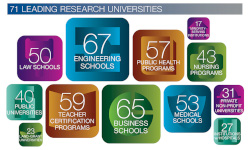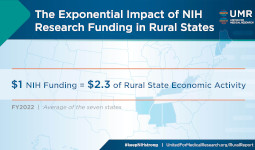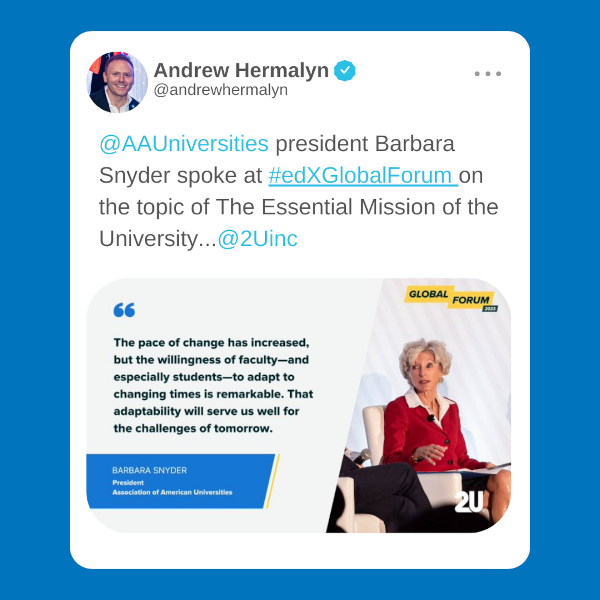 Updated Data Show the Value of America’s Leading Research Universities
Updated Data Show the Value of America’s Leading Research Universities
We recently updated our “AAU by the Numbers” document. This resource provides concrete data about how America’s leading research universities boost the nation’s economy, conduct the majority of our nation’s most critical research, and provide tremendous value to students.
The numbers show that, in 2021, AAU universities awarded 51% of all research doctoral degrees and 22% of all undergraduate degrees in STEM and social sciences earned in the United States. The majority of students at AAU universities (57%) graduated debt-free in 2021 and 83% graduated within six years (the six-year graduation rate for Pell Grant recipients was 76% at AAU institutions, compared to 52% at non-AAU universities). Our members also received 64% of the federal funding allocated for academic research and development in 2021 and produced innovative technologies that led to almost 5,000 patents and 622 start-ups in 2022.
AAU universities transform lives through education, research, and innovation – and the numbers prove it.
 New Report Shows the Impact of NIH Funding on Rural States
New Report Shows the Impact of NIH Funding on Rural States
United for Medical Research, of which AAU is a founding member, released a report last week outlining the exponential impact funding from the National Institutes of Health has on rural states. The report specifically examined the impact of NIH funding on seven largely rural states: Alabama, Arkansas, Kentucky, Maine, Mississippi, New Hampshire, and West Virginia.
The report found that, in 2022, NIH funding “supported an average of 2,300 jobs and $353 million in new economic activity per state, or $2.3 dollars of economic activity for each dollar of NIH research funding.” The report noted that NIH research funding directly supports jobs, generates sales, and helps rural states attract highly skilled workers in addition to improving health and providing “hope for individuals and families affected by disease.” The report also provided state-level data on NIH’s economic impact and argued that maintaining robust funding for NIH is “crucial to the health and economic well-being of rural communities everywhere.”
 Senate HELP Committee Holds Hearing on Nomination of Monica Bertagnolli as NIH Director
Senate HELP Committee Holds Hearing on Nomination of Monica Bertagnolli as NIH Director
Last week, the Senate Health, Education, Labor and Pensions (HELP) Committee held a hearing on the nomination of Monica Bertagnolli to serve as director of the National Institutes of Health. Bertagnolli is currently the director of the National Cancer Institute and has previously served as the Richard E. Wilson Professor of Surgery at Harvard Medical School and a surgeon at Brigham and Women’s Hospital in Boston.
During the hearing, Bertagnolli fielded questions on drug pricing, research into treatments for diseases such as Alzheimer’s and long COVID, and health disparities in rural America, among other topics. She noted that her three main priorities as NIH director would be to make treatments “available and affordable;” to improve the efficiency and diversity of clinical trials and research; and to “restore faith and trust in our nation’s top scientists.” A video of the hearing is available here.
The committee is scheduled to meet again to vote on Bertagnolli’s nomination on October 25. According to Science, “The full Senate is expected to vote on the nomination before the end of the year.” Earlier this year, AAU President Barbara R. Snyder released a statement supporting Bertagnolli’s nomination. AAU also joined the American Association for the Advancement of Science and more than 100 other higher education and scientific organizations in sending a letter in June urging leaders of the Senate and the Senate HELP Committee to swiftly confirm Bertagnolli.
Council of Graduate Schools Releases New Report on Graduate Enrollment and Degrees
The Council of Graduate Schools has released its latest report on the state of graduate enrollment and degrees at institutions of higher education in the United States. The report found that, while graduate school applications went up in fall 2022 compared to the previous year, overall enrolments in graduate school declined by 4.7%.
The report found that “applications for admission to U.S. graduate schools rose by nearly 4%” between fall 2021 and fall 2022, “demonstrating college graduates’ continued demand for advanced training.” However, “domestic first-time graduate enrollment declined by 4.7%” as did enrollment for underrepresented minority groups, which “experienced declining first-time enrollments in the range of 2-8%.” In contrast, international graduate first-time enrollment went up by 10.2%.
CGS noted that the decline in domestic enrollment could be a result of students taking advantage of a tight labor market “to pursue short-term income rather than graduate education.” Nevertheless, the report noted, “The overall outlook for the graduate education community remains positive, evident by increasing applications for admission to U.S. graduate schools.”
News of Interest
CNN: Debate Over the Israel-Gaza War Has Raised Tensions – and the Stakes – on College Campuses – The outbreak of war following deadly terrorist attacks on Israel by Hamas has led to a surge of political debate and protests on college campuses nationwide. Many campuses are facing backlash for statements made by students, faculty, or administrators on the war, but experts on campus free speech say that “debate on such fraught topics is exactly what college campuses are all about.”
WNDU: Notre Dame President Rev. John Jenkins Stepping Down at End of Academic Year – University of Notre Dame President Rev. John Jenkins announced that he will be stepping down at the end of this academic year and returning to teaching and ministry. In his 19 years as president, Father Jenkins “made it his mission to enhance the research pursuits of the university” while fulfilling Notre Dame’s original mission to be “a powerful force for good in the world.” Father Jenkins’ leadership led to Notre Dame becoming “one of the fastest-growing research universities in the nation” and an invitation to join AAU earlier this year.
Forbes: University of California - Berkeley and NASA to Build New $2 Billion Space Research Center – The University of California, Berkeley is partnering with NASA and the industry to build the Berkeley Space Center, an estimated $2 billion research facility that would provide a venue for private companies to “work alongside UC Berkeley faculty and students and NASA scientists and engineers conducting high tech research and developing innovations in aviation, climate change, space exploration and other topics.” UC Berkeley Chancellor Carol Christ said that these new collaborations would help “speed the translation of research discoveries into the inventions, technologies and services that will advance the greater good.”
The Hill Times: Universities Are a Critical Piece of the Climate Change Puzzle – In an opinion piece, University of Toronto President Meric Gertler outlines what Canadian universities are doing to help mitigate the climate crisis and how the Canadian government could help “move the needle further” by making “significant investments in university climate research and action” and by helping universities reduce their own emissions. Gertler highlighted several climate research initiatives at Canadian universities, including the University of Toronto’s Climate Positive Energy initiative, which is taking a multidisciplinary approach to finding ways to transform energy systems.
CBS News: University of Michigan Unveils New Super Powerful Laser – The University of Michigan unveiled a new, powerful laser this month that “allows researchers to study pulses that have never been created on Earth before.” The laser will help scientists study the cosmos and develop medical treatments for diseases like cancer.
Forbes: The Latest Idea in Financial Aid: Harvard’s $2,000 ‘Launch Grants’ – Earlier this month, Harvard University announced that it will award $2,000 “launch grants” to students with an annual family income of $85,000 or less to help “pay for post-Harvard activities like traveling for job interviews, attending a professional conference or buying test preparation materials for professional school applications.” The launch grants are intended to mirror the “start-up grants” some first-year students receive to help cover the costs of transitioning to Harvard.
Featured Research

Do Dogs Prefer Treats or Toys? UF Researchers Discovered the Answer
In a study conducted by University of Florida psychologists, nine out of 10 dogs selected food over toys when given the choice. The study also showed that dogs worked harder to get a favorite treat, but “gave up earlier when offered a preferred toy reward.” The research suggests that dog trainers seeking to avoid rewarding dogs with food during training must “start really early with toys as a reinforcer” and not have “toys competing with food.”

As Drone Traffic Increases, Researchers Turn to AI to Help Avoid Collisions
As more drones take to the air to deliver packages or monitor traffic, the chances of drones colliding are expected to increase. A team of researchers at Johns Hopkins University are using “artificial intelligence to model a system that could more safely orchestrate drone traffic” in the near future. Using collision avoidance and deconfliction algorithms, the team greatly reduced –and in some cases nearly eliminated – airspace accidents.
From Our Feeds

Earlier this month, AAU President Barbara R. Snyder spoke at the 2023 edX Global Forum here in Washington. The forum was hosted by 2U, the company that runs the online learning platform edX, and focused on the future possibilities of high-quality online education. During the forum, President Snyder participated in a “fireside chat” with University of Miami President Julio Frenk about the enduring mission of universities in the face of the changing landscape of higher education.
President Frenk noted how higher education is currently on the threshold of a revolution driven by artificial intelligence and automation, advancements in learning science, and the incorporation of new technologies to enhance student experiences. “This paves the way for a more active, personalized, adaptable, and flexible approach to education,” he said. President Snyder also spoke about how the remarkable flexibility and adaptability of students and faculty has helped universities pivot during changing times and will continue to serve higher education well in the face of future challenges.